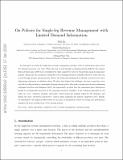| dc.contributor.author | Ma, Will | |
| dc.contributor.author | Simchi-Levi, David | |
| dc.contributor.author | Teo, Chung-Piaw | |
| dc.date.accessioned | 2021-10-25T14:17:55Z | |
| dc.date.available | 2021-10-25T14:17:55Z | |
| dc.date.issued | 2020-12 | |
| dc.date.submitted | 2018-10 | |
| dc.identifier.issn | 0030-364X | |
| dc.identifier.issn | 1526-5463 | |
| dc.identifier.uri | https://hdl.handle.net/1721.1/133079 | |
| dc.description.abstract | In this paper, we study the single-item revenue management problem, with no information given about the demand trajectory over time. When the item is sold through accepting/rejecting different fare classes, the tight competitive ratio for this problem has been established by Ball and Queyranne through booking limit policies, which raise the acceptance threshold as the remaining inventory dwindles. However, when the item is sold through dynamic pricing instead, there is the additional challenge that offering a low price may entice high-paying customers to substitute down. We show that despite this challenge, the same competitive ratio can still be achieved using a randomized dynamic pricing policy. Our policy incorporates the price-skimming technique originated by Eren and Maglaras, but importantly we show how the randomized price distribution should be stochastically increased as the remaining inventory dwindles. A key technical ingredient in our policy is a new “Valuation Tracking” subroutine, which tracks the possible values for the optimum, and follows the most “inventory-conservative” control, which maintains the desired competitive ratio. Finally, we demonstrate the empirical effectiveness of our policy in simulations, where its average-case performance surpasses all naive modifications of the existing policies. | en_US |
| dc.language.iso | en | |
| dc.publisher | Institute for Operations Research and the Management Sciences (INFORMS) | en_US |
| dc.relation.isversionof | 10.1287/OPRE.2020.2048 | en_US |
| dc.rights | Creative Commons Attribution-Noncommercial-Share Alike | en_US |
| dc.rights.uri | http://creativecommons.org/licenses/by-nc-sa/4.0/ | en_US |
| dc.source | arXiv | en_US |
| dc.title | On Policies for Single-Leg Revenue Management with Limited Demand Information | en_US |
| dc.type | Article | en_US |
| dc.identifier.citation | Will Ma, David Simchi-Levi, Chung-Piaw Teo (2020) On Policies for Single-Leg Revenue Management with Limited Demand Information. Operations Research 69(1):207-226. | en_US |
| dc.contributor.department | Massachusetts Institute of Technology. Institute for Data, Systems, and Society | |
| dc.contributor.department | Massachusetts Institute of Technology. Department of Civil and Environmental Engineering | |
| dc.contributor.department | Massachusetts Institute of Technology. Operations Research Center | |
| dc.relation.journal | Operations Research | en_US |
| dc.eprint.version | Original manuscript | en_US |
| dc.type.uri | http://purl.org/eprint/type/JournalArticle | en_US |
| eprint.status | http://purl.org/eprint/status/NonPeerReviewed | en_US |
| dc.date.updated | 2021-10-21T17:00:33Z | |
| dspace.orderedauthors | Ma, W; Simchi-Levi, D; Teo, C-P | en_US |
| dspace.date.submission | 2021-10-21T17:00:35Z | |
| mit.journal.volume | 69 | en_US |
| mit.journal.issue | 1 | en_US |
| mit.license | OPEN_ACCESS_POLICY | |
| mit.metadata.status | Authority Work Needed | en_US |
